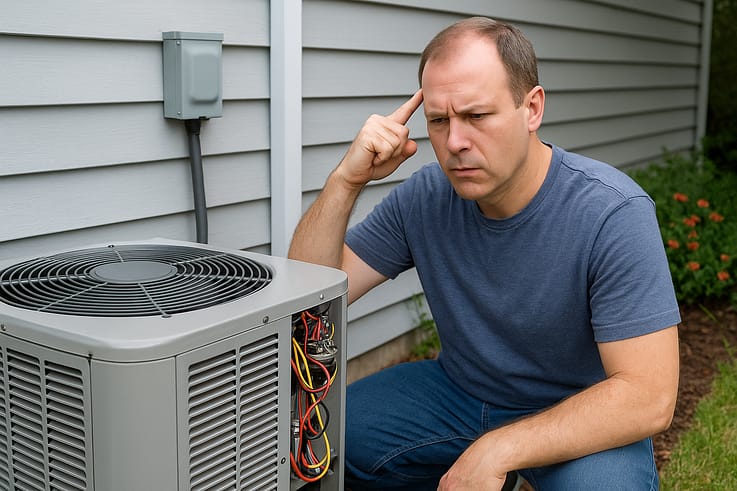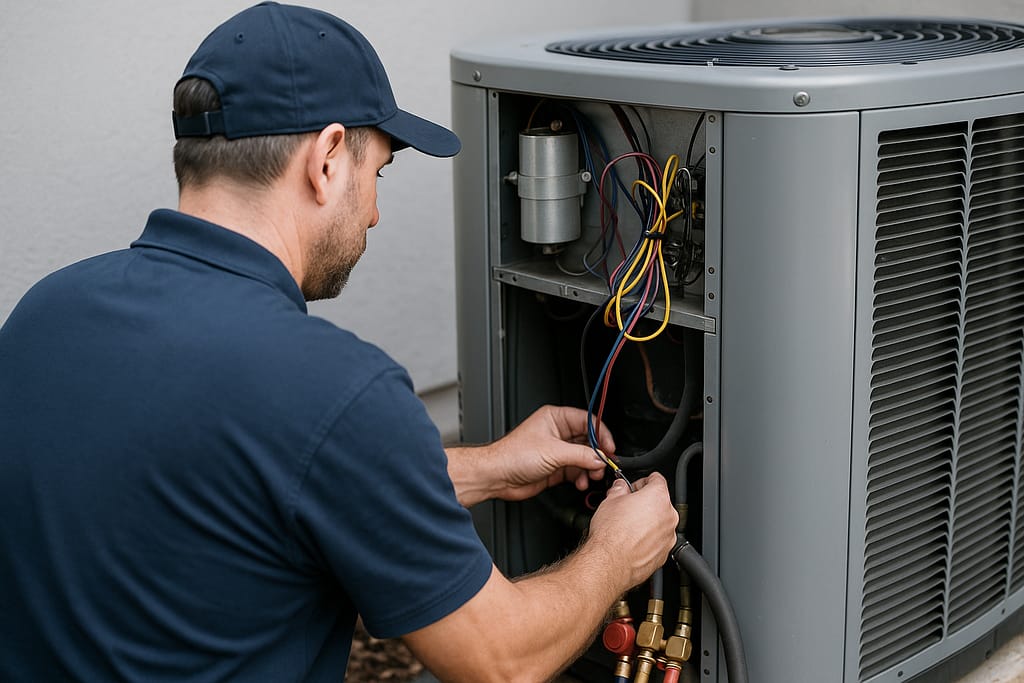
My AC Won’t Turn On: 5 Things to Check Before Calling for Repair
When your AC won’t turn on in the middle of a hot Florida day, it feels like the worst possible timing. Before you start worrying about expensive repairs, there are a few simple things worth checking first. Many AC problems have surprisingly easy fixes you can handle yourself.
If you’re wondering “why won’t my AC turn on,” you’re not alone. Most homeowners face this at some point. Some issues take just a few minutes to solve and won’t cost you anything to try. Here are five things to look at before picking up the phone.
Five Things to Check When Your AC Won’t Start
Power problems, dirty parts, and setting mix-ups cause most cases when an AC unit won’t turn on. Let’s go through each one.
1. Look at Your Thermostat First
Start here because it’s the easiest fix. If your thermostat is blank and AC is not working, try replacing the batteries. That solves the problem more often than you’d think.
After that, double-check the settings. The thermostat should be on “Cool” with the temperature set at least 5 degrees below what it currently is in your house. Someone might have accidentally bumped it to “Heat” or “Off.” If you’re still asking “why is my thermostat blank” after putting in fresh batteries, there might be a wiring problem.
2. Check Your Circuit Breaker
A tripped breaker is one of the most common reasons why your AC is not turning on. Summer storms or running too many appliances at once can flip it.
Find your electrical panel (usually in the garage or a utility closet) and look for the switch labeled “HVAC” or “AC.” If it’s halfway between on and off, flip it all the way off first, then back on. That’s it. If your breaker keeps tripping after you reset it, stop there and get help. Something bigger is going on.
3. Take a Look at Your Air Filter
A really dirty filter can actually shut down your whole system. When air can’t flow through, the evaporator coil freezes up, and safety features kick in to stop the unit from running.
Pull your filter out and hold it up to the light. Can’t see through it? Time for a new one. Filters should be changed every 1-3 months depending on how much you use your AC and if you have pets. Regular HVAC maintenance includes filter changes, and this simple task prevents a lot of headaches. Most systems from Carrier, Trane, Lennox, and Rheem all have the same issue when filters get too dirty.
4. Check the Condensate Drain Line
Your AC creates a lot of water in Florida’s humidity. That moisture drains out through a pipe, but algae and gunk can clog it up. When the drain pan gets too full, a safety switch turns everything off to avoid water damage.
Look for a white PVC pipe near your indoor unit. If you can see the drain pan, check if there’s water sitting in it. You can try clearing small clogs yourself with a wet/dry vacuum on the outdoor drain opening. Many people don’t realize an AC that won’t turn on can be caused by a drainage problem rather than a mechanical issue.
5. Go Outside and Check the Unit
Walk outside and take a look at your condenser unit. If your indoor unit is running but the AC fan is not turning on outside, you’ve found your problem. First, make sure the unit didn’t get unplugged and that the emergency shut-off switch nearby isn’t turned off.
Look for obvious stuff like leaves or debris blocking the unit, wires that look damaged, or ice on the parts. Clear away anything within two feet of the unit. If you see ice, turn off the system and let it thaw completely before trying again. This can take up to a full day.

When These Checks Don’t Work
If you’ve gone through all five of these and your AC unit is not turning on still, the problem is probably internal. Things like bad capacitors, broken contactors, refrigerant leaks, or compressor problems need someone with training and equipment to fix safely.
Getting regular maintenance catches a lot of these issues before they cause your system to quit completely. Annual checkups keep things running and help your AC last its full lifespan, which is usually 10-15 years for most home systems.
If your AC still won’t start after trying these steps, professional AC repair services can quickly identify and fix the problem. Technicians have the right equipment to handle electrical problems, refrigerant issues, and internal parts that go beyond basic troubleshooting.
Don’t try fixing things that involve electrical work, refrigerant, or taking apart internal components yourself. Those jobs need certification and can be dangerous. Stick to the maintenance checks above and leave the technical work to people trained on your specific system.

